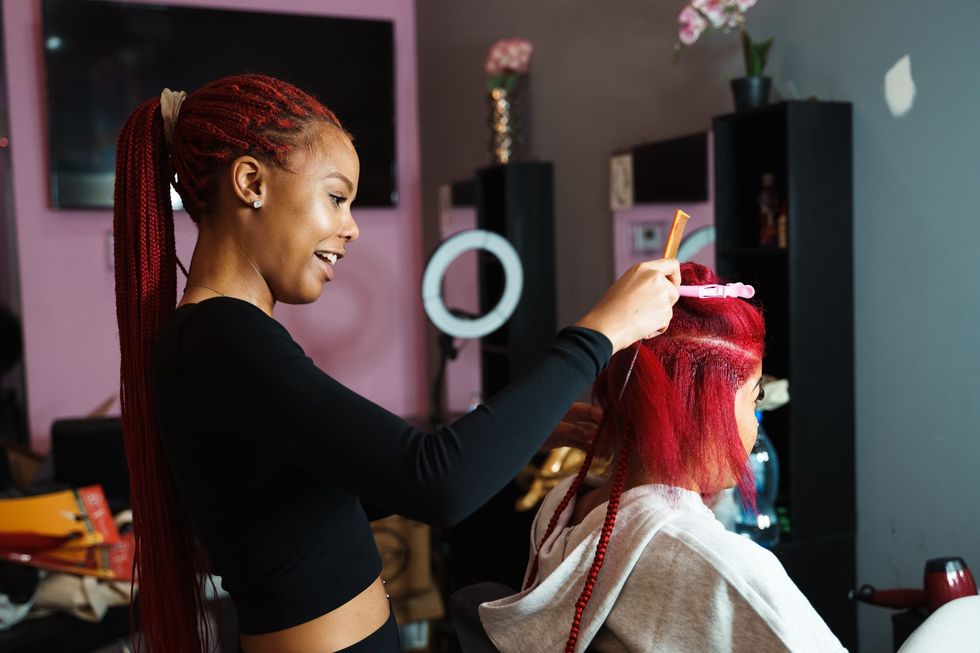
The older you get, the more you realize that life is all about reinvention, especially when it comes to your career. For some of us, this means leveling up in skills, emotional intelligence, and leadership mastery for a promotion, while for others, this means totally changing how we approach work, what we're known for, and the career we actively pursue.
This article is for the latter: for the sis whose current career has run its course, the professional who has outgrown her industry, or the woman who wants to lean a bit more heavily into other facets of being a multi-hyphenate creative. If you've made the decision to make a total 360 in your career, first, congrats.
It takes a lot of courage and a bit of crazy. And you're not alone. Queen Latifah went from bold '80s raptress rocking the regal crowns to acting in iconic sitcoms to becoming a music and Hollywood mogul. Rihanna was singing dancehall-laced tunes in the early 2000s, cut her hair and went pop (selling out global arenas), and is now a hot mama of two, taking billion-dollar beauty brand meetings.
Coco Jones went from giving us sugary-sweet Disney vibes to sultry R&B hits. Tracee Ellis Ross morphed from model-daughter-of-Diana-Ross to award-winning cult-classic actress, to fashion icon, to haircare brand boss. Eve was riding rough as a blond-haired hip-hop legend, got her own TV sitcom, then went into the shadows for a bit, only to emerge as the wife of a wealthy British entrepreneur and cash in on millions of her own (with a new book release to boot).
If these examples still don't convince you that you're on to something good, and you're a bit lost as to where to start your reinvention, try these steps to get you going:
1. Get honestly clear on who you are as a professional and what you currently offer.

Getty Images
If you don't know who or what you already are in your career, you don't really have a foundation for envisioning who or what you can or will become. A great place to start is adding 30 minutes of devotional, silence, meditation, or prayer time in the morning or evening (or both). This creates space for self-reflection, gratitude, and positive vibes.
Then, carve out at least 30 minutes to an hour a day to write out who you think you are professionally and what people have said you are (i.e., performance reviews, LinkedIn recommendations, career success metrics, or verbal insights from work friends, mentors, and former managers who can offer constructive criticism as well as insights on what you're good at). Ask your network to support you in getting this information. (You can even get creative with this. I once sent surveys using Google Forms.)
Once you've done this assessment and you are clear on the actual reality of where you are (versus an inner perception that might be based on ego, trauma, fear, or, let's just be honest, lies fed by negative self-talk), plan for who and what you want to be, starting today, even if that happens in the form of a brain dump, vision board, or to-do list.
2. Dip a toe in that future career water first to get experience before taking the big leap.
More than a decade ago, award-winning actress Niecy Nash was known most for thriving in comedic roles until she advocated for herself and began to go for more dramatic parts. After six years of success with the early 2000s TV series, Reno 911!, (and several other comedic TV and film roles before that), she was mostly known for her ability to command attention through slapstick antics, satire, and witty comebacks. During that period, she still appeared in smaller roles on dramas like ER, CSI: Crime Scene Investigation, and NYPD Blue.
“Once they found out I was funny, it was like, ‘You’re just that,’ ” she told Backstage about her start in comedy despite having dreams of being a dramatic actress. “But because I wanted to work, that part of my gift opened the door first. I rode the wave of that for quite a long time before it finally manifested into what I saw in my head at the beginning.”
Now, the 2020s have been a winning one for her, as she's won big among audiences and critics alike for her major dramatic roles in films and series like Selma, Scream Queens, Clawz, When They See Us, and Monster: The Jeffrey Dahmer Story.
Consider this as one powerful example of how making small strategic pivots to pursue elements of your major reinvention today can lead to big success tomorrow.
3. Take deliberate, but small steps to change your current habits.
This is especially important when your reinvention includes more financial freedom (or wealth) or you're looking to make a major physical change as part of your reinvention. In the very wise words of author Octavia Butler, “Habit is more dependable. Habit will sustain you whether you're inspired or not. … Habit is persistence in practice." And I'm sure you've read or heard this somewhere on social, but I'll remind you anyway, "You can't change while embracing the same habits."
Start with micro-actions and be consistent for 10, 20, or 30 days initially. This could be waking up 30 minutes earlier to work out, committing to (and even buying tickets for) two networking or professional events outside of your industry per month, or simply getting a new haircut or hair color (and setting the follow-up maintenance appointments immediately after your service is complete).
If you're a homebody but the new you requires more networking, get out there, even if it's to volunteer once a month. If you need additional skills, invest in a 6-week online course, certifications, or a 2-year program at a local community college (and allow the money you've paid to be your accountability partner.) If you're always hanging out with your healthcare besties for brunch, but you're trying to break into cybersecurity, take one weekend from that crowd and give it to a new crew who's in the other industry. Create new systems around new goals and stick to them.
4. Get more active on social to showcase the new (or future-loading) you.
If you think constantly posting on social is cringe, you might want to forget the shame, apprehension, or snobbery, slap the dust off those LinkedIn, Facebook, or Instagram profiles, and showcase the new you on those platforms (or at least who you're shifting to be).
Personal branding isn't just for influencers. Create a content calendar, start posting at least once per week (as a way to, again, build a new habit of consistency and discipline), and simply showcase the new you. Think of it as a fun project just for your own enjoyment and personal satisfaction.
Take new photos for your personal website, your social media banners, and profile photos. And you don't necessarily need to do a full-on shoot for this. Maybe there are photos you've already taken that better reflect the new vibes you want out there, or simply set up an affordable tripod with your phone, go somewhere local with good daylight (i.e., your home office, living room, veranda, or apartment complex's lobby---all places I've taken great photos for websites) and get to snapping.
If you've been put in a box in terms of the expertise or skills you're known for, post useful information, blogs, videos, or other content that showcases new knowledge or areas of interest. Update your photos, share the latest news, watch the analytics, and find out how you can collaborate with others in the industry you're looking to break into.
If your reinvention includes more public speaking opportunities, research appointments, or a promotion in your current industry, showcase yourself like that powerhouse executive with real knowledge and talent and offer your unique way of breaking down processes, problem-solving, and everyday issues professionals face. Follow the people you admire who have actually done what you want to do (or similar) or who spark inspiration, self-discovery, and empowerment for you.
5. Do at least one thing that makes you afraid or is out of your comfort zone but is a big part of bringing the future new you to life.

RoGina Montgomery/Getty Images
Known as the always responsible marketing manager but want to totally transition out to get into stand-up comedy? Hit up that Open Mike Night Amateur Talent Show, or audition once a week, even if you could face boos or rejection. Get a coach or agent. Join an acting class or improv group. Start doing social media videos or hosting small events of your own.
Need something to help you stand out and boost your confidence when you're trying to land clients? Ditch that long dark center-part lace front, and try a chic auburn bob. Change that makeup routine you've been doing for the past few years and start wearing other brands and colors.
Want to work on boosting your self-confidence while gaining a new skill? Start an outdoor running challenge, learn a new sport by joining a local team, or take lessons on how to play an instrument. The completion of the course or that 10th practice session alone will be exactly what you need to be bolder in other aspects of your career reinvention journey.
Track your progress either via a video diary (that you can keep private), photos, or journaling. This helps you to be able to review what has worked and what hasn't, and it can help you avoid repeating cycles that won't allow for reinvention.
If you find yourself super-challenged doing these things consistently, make that virtual (or in-person) appointment with a coach or therapist because there might be a need for self-exploration and mental wellness assistance before fully pursuing the reinvention plan, and that's absolutely okay.
Let’s make things inbox official! Sign up for the xoNecole newsletter for love, wellness, career, and exclusive content delivered straight to your inbox.
Featured image by Westend61/Getty Images
This Is How To Keep 'Holiday Season Stress' From Infecting Your Relationship
Hmph. Maybe it’s just me, but it seems like there is something really weird happening in the fall season air (because winter doesn’t officially begin until December 21) that cuddle season is in full swing while break-up season is as well. In fact, did you know that break-ups are so popular during the holiday season that December 11 is deemed Break-Up Day?
The reasons why relationships shift around this time vary; however, I did both roll my eyes and chuckle when I read that a very popular one is because it’s an easy way to get out of getting one’s significant other a Christmas present. SMDH.
Anyway, I personally think that the less shallow folks out here may contemplate calling things “quits” or they at least distance themselves a bit from their partner (and what I’m referring to is serious relationships) due to all of the stress and strain that oftentimes comes with the holidays whether it be financial, familial, due to their tight schedules or something else.
Listen, I would hate for you and your man to miss the fun and happiness of experiencing this time of year, all because you are so overwhelmed or irritated that you can’t really enjoy it. That’s why I have a few practical tips for how to avoid allowing the typical holiday season stress from INFECTING your relationship.
Manage Your Expectations
 Giphy
GiphyUnmanaged expectations. If there is a main reason why the holiday season tends to be so stress-filled for so many people, I’d bet good money that this is the cause. And when you’re in a long-term relationship, expectations can manifest themselves in all sorts of cryptic and/or unexpected ways. You might have relatives who assume that you are going to be with them for Thanksgiving or Christmas when you have other plans in mind. You might be thinking that you are going to spend one amount for presents while your man is thinking something totally different. When it comes to scheduling, your signals may be crossed.
And you know what? To all of these scenarios, this is where clear and consistent communication come in. Don’t assume anything. Don’t dictate anything either. From now until New Year’s, mutually decide to check in once a week, just to make sure that you are both on the same page as it relates to the holidays and what you both are thinking will come along with it. The less blindsided you both feel, the less stressed out you will be. Trust me on this.
Set (and Keep) a Budget
 Giphy
GiphyOkay, so I read that last year, 36 percent of Americans incurred some type of holiday-related debt. Hmph. Last year, there was still some sense of normalcy in this country, chile, so I can only imagine what finances are gonna look like over the next several weeks. That said, since I don’t know a lot of people who don’t find being broke stressful, make sure that you and your bae set a budget and then stick to it this year — no ifs, ands or buts.
Because really, y’all — it doesn’t make sense to deplete savings and/or max out credit cards for a few days of giggles only to be damn near losing your mind because you don’t know how to make ends meet come Dr. Martin Luther King, Jr. Day.
And by the way, this tip doesn’t just speak to things like food and gifts; I also mean travel. If it doesn’t make a ton of sense (or cents) to be all over the place this year — DON’T BE.
Keep Matthew 5:37 at the Forefront
 Giphy
GiphyIf off the top of your head, you don’t know what Matthew 5:37 says, no worries, here ya go: “But let your ‘Yes’ be ‘Yes,’ and your ‘No,’ ‘No.’ For whatever is more than these is from the evil one.” That verse right there? Oh, it’s a boundaries lifesaver! I say that because do you see “maybe” or “I’ll think about it” in there? Nope. LOL. It says that you should tell people “yes” or “no” and leave it at that — and that complements Anne Lamott’s quote, “’No’ is a complete sentence” impeccably well. Yeah, you’ve got to remember that anything beyond a yes or no to a request is privileged information; you don’t owe anyone details or an explanation.
Besides, if you are really honest with yourself, when someone asks you something and you give a “Umm, let me think about it” kind of reply, more times than not, you already know what your answer is going to be — so why not let you both off of the hook? Give your response. Commit to that. And let everyone (including yourself) get on with their lives and schedules.
I promise you that when it comes to those holiday parties, you are pissing more folks off by not RSVP’ing or doing so and not showing up than just saying, “Thank you but not this year” off the rip.
Remember That Your Personal Space Is Privilege Not a Right
 Giphy
GiphyA friend of mine recently bought a new house and invited me over to come see it. He’s a single man with no children, so as I was taking in all of the space that he had, especially as I walked through his finished basement, I joked about relatives coming to live with him. “Hell no” and “absolutely not” were pretty much his immediate responses as he went on to say that some folks even had the nerve to be offended when he told them that he had no intentions on taking DNA in.
Ain’t it wild how people think that your stuff is their right? And yes, that brings me to my next point. Your home is your sanctuary space. If you want to host folks this year — cool. If not, ALSO COOL. Please don’t let folks (family included) guilt you into how they want you to act or even into what they would do if the shoe was on the other foot. You are not them — and as one of my favorite quotes states, “If two people were exactly alike, one of them would be unnecessary.” (A man by the name Larry Dixon said that.)
Hell, my friends? They know that I am good for sending them random things that they need or even want all throughout the year. Coming over to hang out at my pace, though. Uh-uh. Chalk it up to being a card-carrying member of the ambivert club yet I like keeping my living space personal — and I sleep like a baby, each and every night, for feeling that way.
Always remember that your space, your time, your resources, your energy and shoot, yourself period (including your relationship), are all things that are your own. You get to choose how, when and why you want to share them. The holiday season is certainly no exception.
Cultivate Some “You Two Only” Traditions
 Giphy
GiphyIt’s not uncommon for some couples to hit me up after the holiday season to “detox.” Sometimes it’s due to the financial drama (and sometimes trauma) that they experienced. Sometimes it’s because they allowed their relatives (especially in-laws) to get more into their personal business than they should’ve. More than anything, though, it tends to be because they didn’t get enough quality time together and so ended up feeling “disconnected.”
Please don’t let that happen. Listen, I’m not even a holidays kind of woman and yet, I will absolutely sit myself down with some hot chocolate and chocolate chip cookies to enjoy a Hallmark holiday film or two. Aside from the fact that most of them are lighthearted and sweet, I also like that they usually focus on couples loving on each other amidst all of the holiday beauty and ambiance — which is something that all couples should set aside some time to do.
Maybe it’s a vacation. Maybe it’s a staycation. Or maybe it’s my personal favorite, A SEXCATION. Whether it’s for a few days, the weekend or even overnight — don’t you let the holidays go by without setting aside time for you and your man to celebrate one another. Don’t you dare (check out “Are You Ready To Have Some Very Merry 'Christmas Sex'?”).
GET. SOME. REST.
 Giphy
GiphyI once read that 8 out of 10 people get stressed out over the holidays and 3 out of 10 lose sleep during to it — and when you’re stress-filled and sleep-deprived, that can absolutely lead to hypersensitivity, making mountains out of molehills and even not being in the mood for sex.
Your relationship can’t afford to go through any of this, so definitely make sure to prioritize rest. I don’t care how unrealistic it might seem during this time, sleep should never be seen as a luxury; it will always and forever be a great necessity.
That said, try to get no less than six hours of shut-eye in (check out “6 Fascinating Ways Sex And Sleep Definitely Go Hand In Hand”) and even ask your bae to take a nap with you sometimes (check out “Wanna Have Some Next-Level Sex? Take A Nap, Sis.”). Not only will sleep help to restore your mind, body and spirit but, when it’s with your partner, it’s an act of intimacy that can make you both feel super connected, even in the midst of what might feel like chaos.
___
Holiday season stress is real. Still, never give it the permission or power to throw your relationship off. Put you and your man first and let the holidays be what they are gonna be, chile.
Let’s make things inbox official! Sign up for the xoNecole newsletter for love, wellness, career, and exclusive content delivered straight to your inbox.
Featured image by Shutterstock
How To Avoid Being An Emotionally Impulsive Spender This Holiday Season
Geeze. Can you believe that we are just a few days out from another Christmas? Yeah, me neither. In fact, because I’m not a holidays person myself (check out “So, What If You Don't Observe Holidays?”), it wasn’t until one of my clients was venting about how stressed out she was due to all of the holiday season procrastinating that she had been doing that I realized just how fast December is actually flying by.
If, like her, you’re feeling frazzled because, although you told yourself last year that you weren’t going to wait until the last minute to “handle your business,” you ended up doing exactly that, fret not. I’ve got 10 tips that can keep you from making emotionally-triggered decisions as far as your financial expenses are concerned. Merry Christmas. #wink
1. Create a Budget. Stick to It.
 Giphy
GiphyBudgets, boy. I recently read that one of the reasons why they don’t work for a lot of people is because many folks don’t have a clue about how much money they spend on a monthly basis to begin with. SMDH. That said, at the end of the day, it’s important to remember that a budget is simply setting boundaries/limits on your spending — and being intentional about moving in this fashion is always a wise move; especially when it comes to this time of the year…especially being that it’s typical for half of all Americans to take on some type of holiday season debt with 17 percent needing six (or more) months to pay it off.
Know what can prevent this kind of financial chaos? A SPENDING BUDGET. Tips for how to create one of your own this year can be found here.
2. Never Shop When You’re Stressed or Pressed
 Giphy
GiphyYou know how they say that it’s not a good idea to go grocery shopping when you’re hungry? Although the holiday season can be a stressful time, avoid shopping for gifts (or décor or food for recipes) when you are feeling stressed out or pressed for time. More times than not, that cultivates anxiety which could cause you to either purchase things that you don’t really want or to spend money that you don’t really have (P.S. If you’re relying on credit cards, that qualifies as money that you don’t really have. Just sayin’).
3. Don’t Keep Up with the Joneses
 Giphy
GiphyKnow something else that can stress you out: trying to keep up with the Joneses. And y’all, now that we have social media, the reality is that envy is at an all-time high. That’s because it can be really easy to watch holiday engagements, holiday trips and folks bragging about the things that they’ve received in times past, only for you to find yourself wishing that you were them — or putting pressure on yourself and those in your world to keep up.
Listen, it is King Solomon who once said, “So are the ways of everyone who is greedy for gain; It takes away the life of its owners” (Proverbs 1:19 — NKJV) and “A sound heart is life to the body, but envy is rottenness to the bones” (Proverbs 14:30 — NKJV) and he’s considered to be the wisest man who ever lived (during his time — I Kings 4:30). Yeah, both of these verses are a spiritual reminder that whatever you are planning to do or give, do it out of the goodness of your heart — not so that you can low-key “outdo” the next guy.
4. No Need to “Tit-for-Tat”
 Giphy
GiphyThis one might be a bit controversial yet I’m totally okay with that. I don’t care what the occasion is, no one is OWED a present. A gift is a voluntary token of one’s appreciation or affection. That said, if you decide to give someone a present this year, don’t automatically expect something in return. If you get something, cool. If not, if you were giving for the right reasons, it really shouldn’t matter (RIGHT?). On the flip side, if someone decides to get you something and you don’t have something to offer in return, also cool.
Other than going to someone’s home for a holiday dinner or party, for anyone to feel like they should have something in hand because someone else does…that’s not giving, that’s competing — and that absolutely should not be the spirit that you are in (or around) during this time of year.
Again, a gift is not an obligatory thing. If you’ve always thought otherwise, it’s time to do some serious reprogramming.
5. Avoid the Pressure to Buy for Lots of Adults
 Giphy
GiphyLast month, Newsweek published an article that said it’s wise to not spend a ton of money purchasing gifts for adults. A financial expert in the piece said that it’s best to buy for kids because, more times than not, you’re going to get adults something that they already have a lot of, they don’t really need or they’re not going to use (beyond maybe regifting) anyway.
If you’re not feeling that insight, my take would be to exchange names and set a price cap for the grown folks. I say that because, I don’t think that people ever outgrow wanting something over Christmas. It’s just that the over-the-top energy should be reserved for the kiddies — and even then, the “4-gift rule” (want, need, read, experience) is probably your best bet for them…financially and otherwise.
6. Go for Thoughtful over Expensive
 Giphy
GiphyIt’s kind of wild how much close-to-torture folks send themselves through to purchase gifts that, a good 6-8 months now, most folks aren’t even going to remember. That’s why it’s also a good idea to purpose in your mind to get something thoughtful over expensive.
Honestly, that’s a big part of the reason why Etsy continues to be a go-to for gifts (for every occasion) for me. It’s because you can oftentimes get things customized/personalized which ends up meaning so much more to people than something that you bought at a generic department store that might have a high price tag yet still lacks in sentimentality and deep meaning.
7. Use Coupons and Promo Codes
 Giphy
GiphyCoupons (and promo codes) are a slippery slope in the sense that…they remind me of when I used to go overboard while thrift store shopping. I say that because, just because I might find several bomb dresses for under $20, what am I going to do with 50 of ‘em (over time)? It’s just as much of a waste of money as buying couture if neither option gets much use.
And that’s kind of the thing about coupons and promo codes. Some people end up overspending because they rationalize that so long as there are discounts attached, it’s all good. At the same time, this doesn’t mean that you should forego coupons and promo codes altogether. The key is to put together your shopping list (and budget) and then use discounts specifically for those items. If you do this, you could save well over $1,000 annually (at least, depending on what you decide to buy).
8. Avoid Add-Ons
 Giphy
GiphyYeah. Dodge add-on expenses. Add-ons like what? The first thing that comes to my mind is a warranty. What’s the chance that someone is actually going to need that? Another example is paying for things to be “professionally” gift wrapped. Chile, throw that stuff in a gift bag with some tissue paper and go on about your day. All good.
9. Rethink Gift Cards
 Giphy
GiphyIf there is any time of the year when there is a noticeable hike in gift card purchases, now would be it. And although they are a convenient approach to gift giving, at the same time, many come with hidden fees, the full amount oftentimes goes unused (which ends up being a waste of money) and they do come with expiration dates that are oftentimes forgotten.
So, if you’re someone who likes to wait until the last minute to do your holiday shopping, resist the urge to impulsively pick up a handful of gift cards. Unless it’s to a place that you know someone is going to use within the next few months, they could end up in somebody’s kitchen drawer for the next couple of years. And what a waste that would be.
10. They’ll Get It When They Do. And That’s Okay.

=
GiphyOne more. Although it is super thoughtful and proactive to get people their gifts in time for whatever occasion you purchased them for, if trying to reach that goal is going to require paying for rush shipping that is damn near as high as the price of gift or spending a lot of gas money that you don’t have at the moment to drive miles and miles away — take the pressure off to spend a ton of cash just to make sure that something arrives at December 25. Listen, through doing business with Etsy, I have learned that through this administration, there are all sorts of tariff issues going on and the USPS is slower than ever too, so paying more may not guarantee much.
The hack? Send a message that something special is coming…soon enough. The thought really is what counts (more times than not); plus, it builds anticipation of something good coming, even if it’s after all of the Christmas Day hoopla. And no one (with sense) is going to have a problem with that.
Now don’t you feel better? Happy Holiday Shopping, sis.
Let’s make things inbox official! Sign up for the xoNecole newsletter for love, wellness, career, and exclusive content delivered straight to your inbox.
Featured image by Shutterstock









